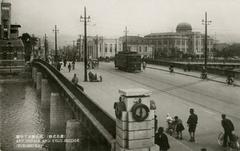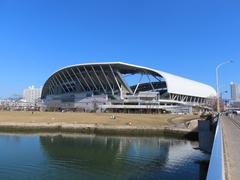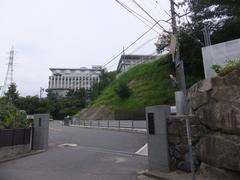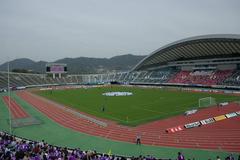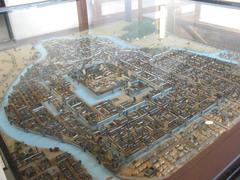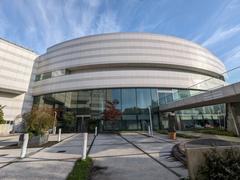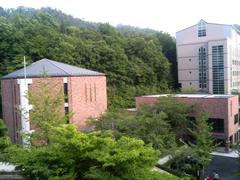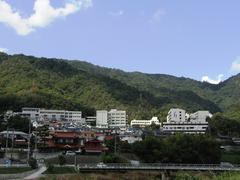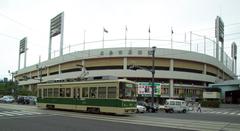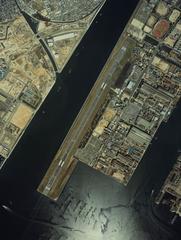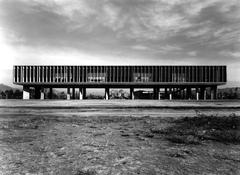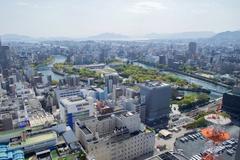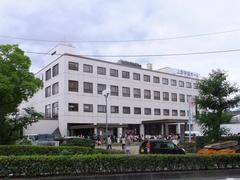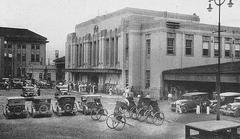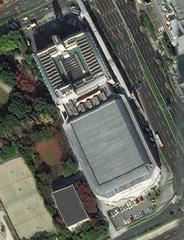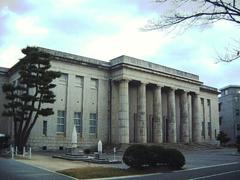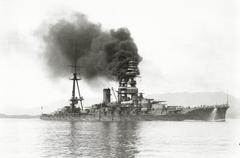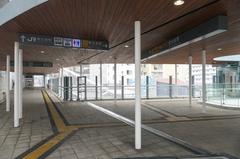
Hiroshima Mitsukoshi: Visiting Hours, Tickets, and Historical Sites in Hiroshima
Date: 04/07/2025
Introduction
Hiroshima Mitsukoshi is a distinguished landmark embodying the confluence of history, culture, and modern retail in the heart of Hiroshima, Japan. As one of the nation’s most esteemed department stores—with roots stretching back to the 17th century—Mitsukoshi’s evolution mirrors Japan’s journey from tradition to modernity. Beyond its renowned retail experience, Hiroshima Mitsukoshi plays a significant role in the city’s postwar cultural revival and is strategically positioned near iconic sites such as the Hiroshima Peace Memorial Park. This guide offers comprehensive insights into Hiroshima Mitsukoshi’s visiting hours, ticketing, cultural significance, and accessibility, while highlighting its integration with Hiroshima’s broader historical and urban landscape. Whether you’re a history buff, culture enthusiast, or avid shopper, this resource will help you plan a meaningful visit to Hiroshima Mitsukoshi and its neighboring treasures.
For detailed updates, refer to resources like the Evendo Mitsukoshi Hiroshima Store, City of Hiroshima Official Site, and Mitsukoshi Ltd. History.
Table of Contents
- Discover Hiroshima Mitsukoshi: A Blend of History, Culture, and Shopping
- Origins of Mitsukoshi: From Edo-Era Merchants to Department Store Pioneer
- Mitsukoshi’s Role in Hiroshima’s Postwar Revival
- Visiting Hiroshima Mitsukoshi: Practical Information
- Special Events & Cultural Experiences
- Key Historical Milestones
- Nearby Attractions & Travel Tips
- FAQ: Hiroshima Mitsukoshi
- Cultural and Commercial Significance
- Social and Community Engagement
- Seasonal and Thematic Attractions
- Integration with Hiroshima’s Urban Life
- Hiroshima Peace Memorial (Atomic Bomb Dome): Visitor Guide
- Hiroshima Peace Memorial Park: Visitor Guide
- Visual & Media Suggestions
- Related Links
- Conclusion and Further Reading
Discover Hiroshima Mitsukoshi: A Blend of History, Culture, and Shopping
Hiroshima Mitsukoshi is more than just a department store—it stands as a testament to Hiroshima’s resilience and cultural vitality. Visitors can immerse themselves in a dynamic environment that seamlessly weaves together luxury brands, traditional artisan products, and engaging cultural events. The store’s proximity to major historical landmarks makes it an essential stop for those wishing to experience Hiroshima’s unique blend of past and present.
Origins of Mitsukoshi: From Edo-Era Merchants to Department Store Pioneer
The Mitsukoshi brand traces its lineage to the 17th-century Mitsui family, who transitioned from samurai to merchants, establishing the Echigoya kimono shop in Matsusaka (Mitsukoshi Ltd. History). By 1904, Mitsukoshi had evolved into Japan’s first modern department store, introducing revolutionary concepts such as fixed prices, one-stop shopping, and Western-style service.
Mitsukoshi’s Role in Hiroshima’s Postwar Revival
Following the devastation of the atomic bombing in 1945, Hiroshima embarked on a profound journey of recovery. The establishment of Hiroshima Mitsukoshi represented more than economic development; it became a beacon of hope, cultural renewal, and international engagement (City of Hiroshima, Evendo Mitsukoshi Hiroshima Store).
Visiting Hiroshima Mitsukoshi: Practical Information
Visiting Hours:
- Open daily from 10:30 AM to 7:30 PM.
- Extended hours may apply during holiday seasons and special events.
Entry and Tickets:
- Entry is free.
- Some special exhibitions or events may require tickets—check the official website or in-store information.
Accessibility:
- Fully accessible with elevators, ramps, and accessible restrooms.
- Staff assistance available for visitors with disabilities.
Location:
- Centrally located near Hiroshima Peace Memorial Park and the Hondori Shopping Street.
- Easily accessible via Hiroshima’s public transportation network.
Special Events & Cultural Experiences
Hiroshima Mitsukoshi hosts a variety of exhibitions, seasonal festivals, fashion shows, and art events. These range from traditional craft displays to contemporary art collaborations, offering a unique platform for both local and international cultural expression (Evendo Mitsukoshi Hiroshima Store).
Key Historical Milestones
- 1673: Mitsui family establishes the Echigoya kimono shop.
- 1904: Mitsukoshi opens as Japan’s first modern department store.
- 1914: Debut of Japan’s first escalator and adoption of Western retail practices.
- Post-1945: Mitsukoshi’s Hiroshima branch symbolizes the city’s postwar rebirth.
- Late 20th Century: Mitsukoshi expands internationally, enhancing its global reputation.
Nearby Attractions & Travel Tips
Beyond Mitsukoshi, visitors can explore:
- Hiroshima Peace Memorial Park: A powerful symbol of peace and remembrance.
- Atomic Bomb Dome: UNESCO World Heritage Site and iconic remnant of Hiroshima’s wartime tragedy.
- Shukkeien Garden: A tranquil Japanese landscape garden.
- Hiroshima Castle: Offers historical exhibits and panoramic city views.
- Hondori Shopping Street: Vibrant pedestrian street for shopping and dining.
Travel Tips:
- Utilize Hiroshima’s efficient streetcar and bus system for easy access to major sites.
- Purchase a day pass for unlimited travel.
- Visit on weekdays or during morning hours for a quieter experience.
FAQ: Hiroshima Mitsukoshi
Q: What are the store’s opening hours?
A: 10:30 AM – 7:30 PM daily.
Q: Is there an admission fee?
A: No, entry is free. Special exhibitions may have separate charges.
Q: Is the store wheelchair accessible?
A: Yes, with elevators, ramps, and accessible facilities.
Q: Are there dining options inside?
A: Yes, a range of cafes and restaurants serve Japanese and international cuisine.
Cultural and Commercial Significance
Historical Context and Evolution
Hiroshima Mitsukoshi’s establishment is intertwined with the city’s transformation, reflecting its resilience and growth (TokyoTreat, ExploreCity). The store’s roots in the Mitsui family’s entrepreneurial spirit set the stage for Japan’s department store revolution.
Cultural Role
Mitsukoshi serves as a hub for cultural exchange, hosting art exhibitions, seasonal festivals, and workshops featuring traditional crafts and kimono displays (JapanActivity). The basement food hall (depachika) showcases local and international delicacies, while upper floors offer pop-up galleries and immersive experiences (Shop Japan Truly).
Commercial Impact
As part of the Isetan Mitsukoshi Group, the Hiroshima branch is a key driver of local commerce, drawing millions of visitors annually and supporting the city’s economic vibrancy. Seasonal sales during summer and winter attract shoppers seeking apparel, home goods, and gifts (Fun Japan).
Services for International Visitors
- Tax-Free Shopping: Available for purchases over 5,000 JPY with a valid passport (TokyoTreat).
- Multilingual Support: Staff and signage in English and Chinese.
- Discounts: 5% off with the Mitsukoshi Isetan Guest Card or app (Mitsukoshi Isetan App).
Social and Community Engagement
Mitsukoshi actively supports local artisans and producers, featuring Hiroshima-made crafts, foods, and sake, and regularly hosts charity events, cultural workshops, and educational programs that reflect Hiroshima’s legacy of peace and community resilience (JapanActivity, World History Journal).
Seasonal and Thematic Attractions
- Rooftop Beer Garden: Open during summer, offering panoramic city views and live music (Fun Japan).
- Gift-Giving Counters: Celebrate Japanese traditions like ochugen and oseibo.
Integration with Hiroshima’s Urban Life
The store’s architecture blends modern design with traditional elements, and its central location near key historical sites makes it a natural part of any Hiroshima itinerary (ExploreCity, World History Journal). Convenient access via streetcar and bus supports sustainable city exploration.
Hiroshima Peace Memorial (Atomic Bomb Dome): Visitor Guide
History and Cultural Significance
Originally the Hiroshima Prefectural Industrial Promotion Hall, the structure survived the 1945 atomic bombing and is now preserved as a powerful symbol of peace. In 1996, the Atomic Bomb Dome was designated a UNESCO World Heritage Site.
Visiting Hours and Ticketing
- Hours: 8:30 AM – 6:00 PM (last entry 5:30 PM); summer hours until 7:00 PM.
- Tickets: Viewing the Dome and park is free. Museum entry: Adults ¥200, students ¥100, children free.
- Purchase: At the museum entrance or online.
Getting There and Accessibility
- By Streetcar: Hiroden Line to Genbaku Dome-mae.
- By Foot: Short walk from Hiroshima Station or Hondori Arcade.
- Accessibility: Wheelchair-friendly with ramps and accessible restrooms.
Key Sites Nearby
- Hiroshima Peace Memorial Museum
- Children’s Peace Monument
- Peace Flame
- Shukkeien Garden
Guided Tours & Events
- Multilingual guided tours are available.
- The annual Peace Memorial Ceremony is held every August 6th.
Photography Tips
- Visit early morning or late afternoon for the best light.
- Remember the site’s solemn purpose—respectful behavior is expected.
FAQ: Atomic Bomb Dome
Q: Is there a fee to see the Dome?
A: No, viewing from outside is free. Museum entry requires a ticket.
Q: What are the least crowded times?
A: Weekday mornings.
Q: Are international visitor services available?
A: Yes, including multilingual signage and guided tours.
Q: Is the Dome illuminated at night?
A: Yes, although park access is limited after hours.
Hiroshima Peace Memorial Park: Visitor Guide
History and Significance
Established to honor atomic bomb victims and advocate for peace, the park features the Atomic Bomb Dome, Peace Memorial Museum, and numerous monuments.
Visiting Hours & Tickets
- Park: Open year-round, typically 8:30 AM – 6:00 PM (seasonal variations).
- Museum: 8:30 AM – 6:00 PM (last entry 5:30 PM), closed Dec 30–31.
- Admission: Park is free; museum: Adults ¥200, students ¥100, children free.
Directions & Transportation
- Tram: Get off at Genbaku Dome-mae.
- Hiroshima Station: 15-minute tram ride.
- Bicycle rentals and taxis available.
Park Highlights
- Atomic Bomb Dome
- Peace Memorial Museum
- Children’s Peace Monument
- Cenotaph for A-Bomb Victims
Travel Tips & Accessibility
- Arrive early for a quieter visit.
- Comfortable shoes recommended.
- Free Wi-Fi at the museum.
- Wheelchair access throughout the park.
- Multilingual brochures and audio guides available.
FAQ: Peace Memorial Park
Q: Is entry to the park free?
A: Yes. Only the museum requires a ticket.
Q: Are guided tours available?
A: Yes, in multiple languages.
Q: Are there discounts for children or seniors?
A: Yes, students receive discounts; children enter free.
Q: Dining options nearby?
A: Yes—Mitsukoshi department store and Hondori Street have a range of restaurants.
Visual & Media Suggestions
Include high-quality images with descriptive alt text:
- “Hiroshima Mitsukoshi department store entrance”
- “Luxury shopping inside Hiroshima Mitsukoshi”
- “Cultural event at Hiroshima Mitsukoshi”
- “Atomic Bomb Dome at Hiroshima Peace Memorial Park”
- “Visitors at Hiroshima Peace Memorial Museum”
Related Links
- Explore Hiroshima
- Evendo: Mitsukoshi Hiroshima Store
- Mitsukoshi Ltd. History
- TokyoTreat Mitsukoshi Overview
- ExploreCity Hiroshima
- JapanActivity Hiroshima Culture
- Fun Japan: Mitsukoshi
- Mitsukoshi Isetan App
- World History Journal: Remarkable Hiroshima 2025
- Hiroshima Peace Memorial Museum Official Site
- City of Hiroshima Tourism Information
- Hiroshima Mitsukoshi Department Store
Conclusion and Further Reading
Hiroshima Mitsukoshi perfectly encapsulates the city’s enduring spirit, offering visitors a journey through history, commerce, and contemporary Japanese culture. Its accessible location near the city’s most significant landmarks—such as the Peace Memorial Park and Atomic Bomb Dome—makes it a gateway to both remembrance and modern urban life. International guests benefit from tax-free shopping, multilingual services, and a variety of cultural offerings, while locals and tourists alike can enjoy seasonal events and community initiatives.
To enrich your visit, consider exploring guided tours, attending cultural exhibitions, and taking advantage of Hiroshima’s efficient public transport. For up-to-date information, exclusive offers, and event notifications, download the Mitsukoshi Isetan app or the Audiala app.
For further information and travel guidance, consult:

